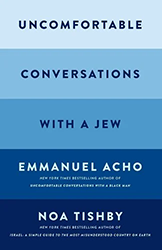Most of us were raised with the story that, in the post – World War II years, Germany understood the consequences of its actions and did everything to make amends. The country is often held up as having accomplished the insurmountable task of proper teshuvah. In his controversial work, De-integrate: A Jewish Survival Guide for the 21st Century, Max Czollek obliterates that fantasy, demonstrating how far Germany has still to go.
Throughout the book, Czollek highlights the myths that Germans have told since the War that have allowed them to move forward. Although Nazis perpetuated atrocities upon the Jews, goes one myth, their German ancestors were victims and powerless. He also rejects the notion that the best kind of Jews are forgiving, no longer angry about what happened. These fables, Czollek explains, take place in the “Theater of Memory,” a kind of communal ritual where Germans commemorate the Holocaust without doing the hard work of actually changing.
In his acerbic, snarky, and often humorous way, Czollek cites countless examples of how Germany is falling short. He writes that the country is voting actual Nazis into the government and turning back to nationalism, with a newfound pride in the German flag. Czollek also resists the idea that Germany has a “guiding-culture” into which all should assimilate; rather, the nation should pride itself on its many and rich ethnic minorities. He comes down hard on Germans for seeing Jews as a kind of model minority but scorning Arabs, whom they view as a threat to Germany’s sense of self. And he takes issue with the fact that Jews were recently called a “gift of us Germans” during a recent Holocaust Remembrance Day Service. “Jewish people are not a gift,” Czollek retorts. “Certainly not for the Germans. And they are not here for, but rather despite the Germans and their history.
Although he phrases it differently, time and again Czollek accuses the German people of gaslighting the Jews. His critique is similar to that of Dara Horn in her book, People Love Dead Jews. That is, by concentrating on the Holocaust but turning away from the real and living problem of antisemitism, Germans seem to care more about the dead Jews in their past than the living ones in their present. Czollek describes a recent scene in which a group of Jews spoke to the mayor of Berlin about their fears. The mayor responded that there was “no danger of antisemitism, and Jews could move about as freely as they pleased.” He then took a quick photo with a Jewish athlete and left.
Czollek argues that the answer to these problems lies not in trying to stitch Jews deeper into the social fabric of Germany. What Germany needs is for its Jews to “de-integrate,” to make themselves “other” again and join in the “larger postmigrant project” of “understand[ing] and advanc[ing] radical diversity as the very foundation of German society.” Jews must not become part of a monolith. Only in their distinctiveness will they wake Germany from its stupor, so that it might begin to pay attention and care about actual Jews, not just its pristine image of them.
Czollek is a poet, and his book reads as such — which means that it is anything but dry theory. It is a call to action and a celebration of an array of Jewish voices. But if Jews are going to change anything, he reminds his readers, they first need to confront their own biases: about Mizrahi Jews, about queer Jews, about impoverished Jews and Orthodox Jews. “And perhaps,” he writes, “we are only just now learning how to recognize our own diversity. Doing this justice means forsaking the Theater of Memory.
This book is required reading for anyone who longs to unsettle the status quo. No matter where you live in the Diaspora, De-integrate will encourage you to look critically at your own society and question the myths that surround your Jewish story.
Rabbi Marc Katz is the Rabbi at Temple Ner Tamid in Bloomfield, NJ. He is author of the books Yochanan’s Gamble: Judaism’s Pragmatic Approach to Life (JPS) chosen as a finalist for the PROSE award and The Heart of Loneliness: How Jewish Wisdom Can Help You Cope and Find Comfort (Turner Publishing) which was chosen as a finalist for the National Jewish Book Award.





